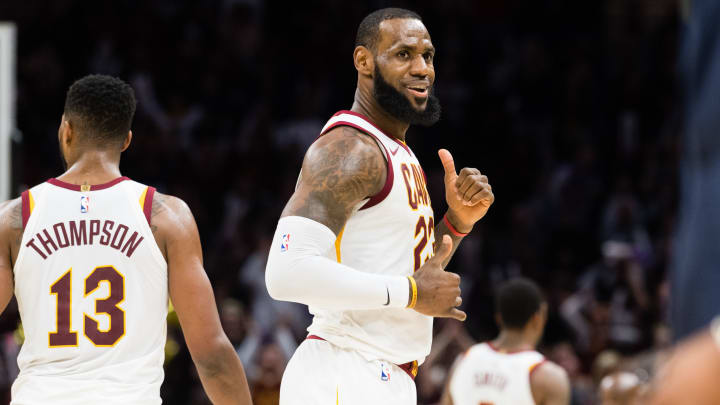LeBron James's Only Underrated Attribute: His Character

I’ll never forget the first time I played against LeBron. His dunk on the right baseline nearly ripped down the rim. My body bounced off his when he drove. Like LeBron, I was a top midwestern high school prospect on the 2001 summer circuit, but to be clear, none of us were like LeBron. Someone that big and athletic, that skilled and intelligent, that magnanimous on the basketball court was unheard of. And, on top of it, people actually liked him. Most young superstars are prickly, but he was personable. He was pleasant. His reputation was solid.
Cleveland Cavaliers Offseason Preview: Will LeBron James Stay or Go?
Though he has since become a father, leader, brand, champion, and icon, his popularity has ebbed and flowed. In 2015, a Harris Poll found that LeBron was the most popular athlete among American adults. The least popular? Also LeBron. Today, with his highly anticipated free agency on the horizon, it’s the same polarizing story. Some marvel at LeBron’s transcendent talent, while others view him as arrogant, selfish, and entitled. On Facebook, the largest anti-LeBron group has 57,000 likes. Similar groups for NBA MVPs Stephen Curry, Kevin Durant, and Russell Westbrook have less than 20,000 likes combined.
Ranking The Top-Five Reasons LeBron James Might Leave Cleveland
LeBron is the sole member of the NBA’s 30,000-point, 8,000-rebound, 8,000-assist club, and given his complete dominance of the 2018 NBA playoffs, his basketball brilliance is undisputed. He is the greatest player of his generation and one of the best ever. Anyone who says otherwise is just trying (and failing) to be provocative. His many detractors, then, almost certainly dislike the person they believe him to be, not the player they know he is. Popularity and likability are subjective, but facts are not. So what does publicly available information indicate about LeBron’s character? What type of human being is LeBron, really? Without knowing him personally, the best the general public can do is gather data. As such, here is a representative sample:
LeBron is accused of flopping too much, whining to officials, and tweeting passive-aggressive barbs at teammates. He has a tattoo on his back that says “CHOSEN 1.” He once wore a t-shirt that read “CHECK MY $TATS.” He has an NBA Finals record of 3–6, which critics link to a perceived lack of hunger, determination, killer instinct, or all of the above. He announced his 2010 departure from the Cavs in an ill-fated ESPN special, famously declaring that he’d “take his talents to South Beach.”
In his 15-year NBA career, LeBron has never gotten in a fight and never been in trouble. He has been ejected from one game and never been suspended. He won the NBA’s J. Walter Kennedy Citizenship Award in 2017 for, among other things, pledging tens of millions of dollars to send thousands of at-risk youth from his hometown of Akron to college. He tweeted the following at a bullied young boy: “Keep your head up buddy and push forward! You're the best.” It was retweeted more than 17,000 times. He has advocated for accessible education, gun safety, and other causes he cares about. He has teamed with Nike to design slip-on versions of his signature shoes for disabled athletes, stating, “Sports should never be taken away from a kid.” He has raised awareness for social injustices involving Trayvon Martin, Tamir Rice, Philando Castile, Alton Sterling, Eric Garner, Cyntoia Brown, and others. He attends his kids’ sporting events and honors his wife on social media. His controversial ESPN special raised over $ 2.5 million for the Boys and Girls Club of America.
The data is clear: In an age when power is wielded irresponsibly, when presidents promote intolerance and indecency, when leaders ignore their obligation to serve, LeBron James stands in direct opposition, modeling behavior that is inclusive, respectful, and generous. As a player, he is unselfish and punishing, yet as a person, he is equally impressive.
LeBron is not just a basketball prodigy, as the narrative often suggests. He is also an undeniable force for good in the world. The impulse to track every detail of his stunning basketball career is understandable—Will he win another championship? Is he the greatest of all time? Where will he take his talents next?—but it’s also limiting, insofar as it obscures an admirable part of his legacy: the excellent example he sets off the court.
“I feel my calling here goes above basketball,” he wrote in Sports Illustrated in 2014 while announcing his return to Cleveland. “I have a responsibility to lead, in more ways than one, and I take that very seriously.”
LeBron is not perfect, but as his track record shows, and as the public seldom acknowledges, he is a man of outstanding moral character. He has unimaginable fame and riches, yet he gives his time, energy, and money to impact others. The wealthy and prominent often keep the value they’ve created for themselves, or worse, exploit their power, but LeBron makes the daily choice to use his platform to inspire and uplift. He cares about society and he cares about humanity.
As he decides where he will continue his legendary career, that is something we should be applauding. He has always and will always captivate us on the basketball court, but let’s also appreciate how he exerts his tremendous influence with care and grace off of it. For a man of his stature, it’s truly something worth celebrating.
